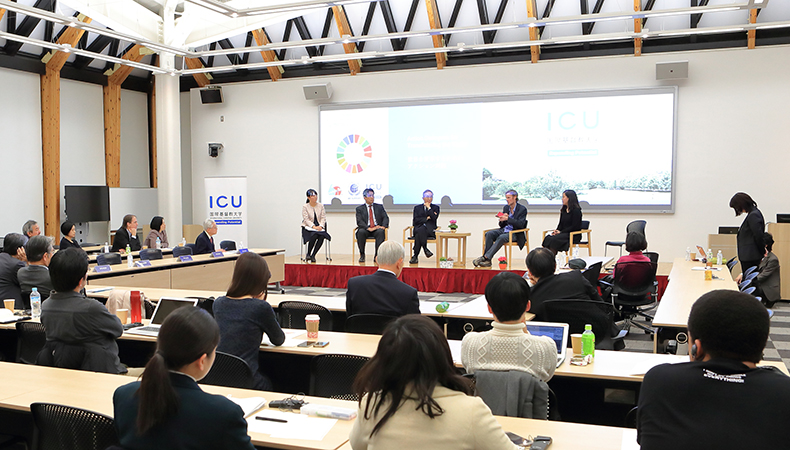NEWS
"Action Dialogues for Achieving the Sustainable Development Goals" Held
Update: March 3, 2017
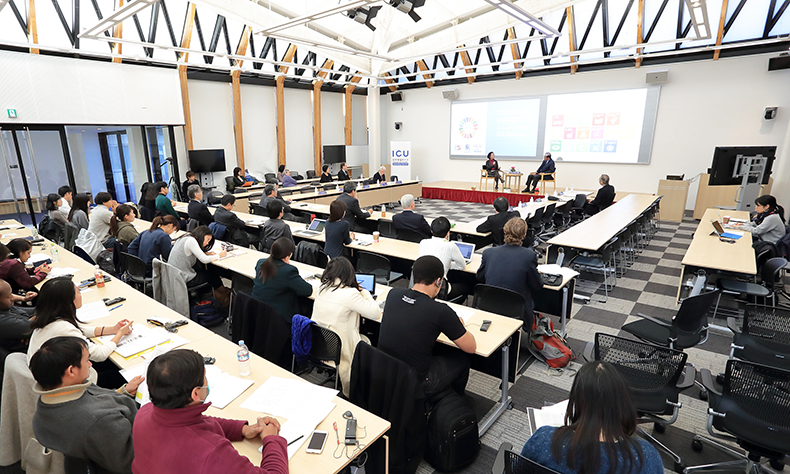
On Saturday, December 17, 2016, anniversary of Japan's entry into the United Nations, a series of sessions, called, "Action Dialogues for Achieving the Sustainable Development Goals" was held (sponsored by the International Christian University Social Science Research Institute). The Sustainable Development Goals (SDGs) were adopted at the United Nations General Assembly of September 2015, as global targets to be realized by the year 2030. How must the world change in order to achieve these targets, swearing to "leave no one left behind"? These Dialogues addressed the United Nations Global Compact* and university policies for contributing to those efforts.
*United Nations Global Compact: A worldwide approach intended to create a sustainable society, in which the signatory companies and organizations take responsibility for creative leadership.
【Talk Session】Education for Sustainable Development and Global Citizenship
Guest: Toshio Arima (Board Member, UN Global Compact; Board Chair, GCNJ)
Interviewer: Junko Hibiya (President, ICU)
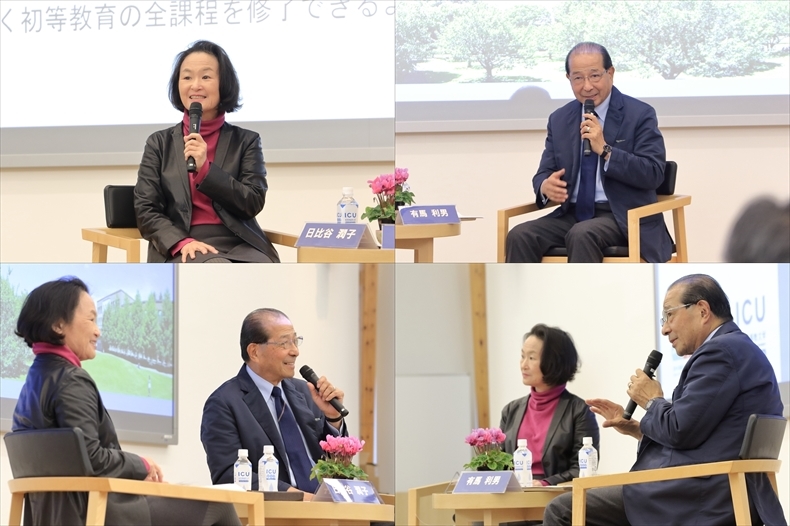
The 17 SDGs include not only issues mainly relevant to developing countries such as poverty and hunger, but also those common to developing and developed countries such as education, decent work, sustainable cities and communities, and biological diversity. One of these, "global citizenship education" as a goal to be achieved by 2030 for high-quality education, was the subject of a talk session given by our alumnus Toshio Arima (class of 1967), former President and Representative Director of Fuji Xerox Co. Ltd., and President Junko Hibiya.
Toward a "global market with a human face"
The 17 SDGs are issues to which the mission of ICU, as a signatory university to the UN Global Compact, is deeply committed.
First, President Hibiya said, "Touching on the MDGs* which preceded the SDGs in my 2013 entrance ceremony speech, I urged students to 'make the most of what you learn at ICU to contribute to society, as there are many people in the world without even the benefit of an elementary education.' Thereafter, I mentioned the SDGs at the commencement graduation ceremony in AY2015, emphasizing the many actions which might be taken immediately in daily life, and the need for all of us to participate in them," she said, looking back on her strong interest in the SDGs and her attempts to bring them to students' attention at every opportunity.
Subsequently, she introduced the UN SDGs website. "Take a look at it and find out just how closely the achievement of the SDGs is bound up with our daily life."
*MDGs (Millennium Development Goals): The UN Millennium Development Goals for the period from 2001 to 2015, focusing on social development issues in developing countries.
SDGs are a large-scale challenge to address, in which countries at every level of development participate. What kind of world do we want to see by the target year of 2030? Mr. Arima discussed this question as follows.
"There are two possible viewpoints here, 'result mode' and 'action mode.' The 'result mode' refers to a focus on results such as market share and profits. The systems and activities leading there are the 'action mode.' First, with regard to the 'result mode,' the SDGs include 17 goals, 169 related targets, and some 230 indicators. We hope to see almost all of these achieved." Further, regarding the "action mode," Mr. Arima pointed out the importance of considering the common conditions required for the world to move forward emphatically toward realizing the SDGs. "Kofi Annan, the former UN Secretary General, has talked about 'a global market with a human face.' He meant a global market with a sense of humanity, not one concerned simply with the pursuit of growth and profit. If this movement can expand and interlink around the world, the realization of the SDGs will come onto the horizon."
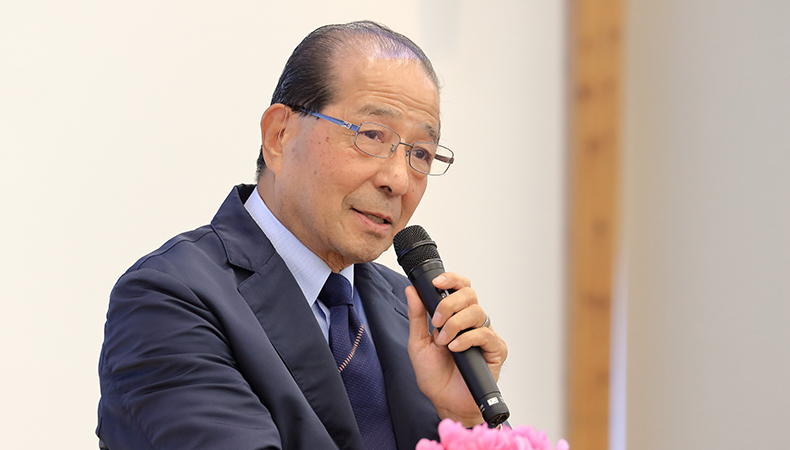
What are "generous dreams"?
In order to nurture the "responsible global citizenship" targeted by the SDGs, university students must acquire the necessary knowledge and skills as well as broad perspectives and vision. In this connection, Mr. Arima related some of his memories of ICU.
"As a student, I had a job walking the dog for Professor Tateo Kanda (professor of Western classics and New Testament studies), and once in a while he would ask me in for tea. He asked me once what my dream was, and I told him I wanted to work overseas and live a comfortable life. "Well, that's rather stingy," he replied. I began to wonder about what a dream that wasn't stingy would be, and that brought me to where I am today. I don't know what Professor Kanda really had in mind, but I think he may have meant doing work that helps people. I hope that I am helping people a little by working to promote the achievement of the SDGs through the UN Global Compact."
Global corporations responsive to world movements
Further, Mr. Arima touched on the close relationship of the SDGs with corporate activities. "Corporations are now very much concerned with CSR, and most of them are working out the relationship between the SDGs and their own CSR activities. For example, at Fuji Xerox, our CSR activities are related to almost all the 17 SDGs. Often, it's not a one-to-one connection but a given approach involving multiple goals."
However, national policies can hamper universal participation, including that of corporations, in efforts to achieve the SDGs.
"A perfect example is the Paris Agreement," Mr. Arima recounted. "This agreement on global warming prevention was established in December 2015, but President Trump of the United States is now indicating his intention to back out of it. However, 365 American companies have released a joint statement saying they intend to observe the agreement. Global corporations are now beginning to take the lead in world movements, going beyond the frameworks of national policies and regulations. And yet, on the other hand, people still have deep-seated resistance to the 'dark side' of these global corporations. That's why we really need a 'global market with a human face.'"
A message to those taking the plunge from university into society
Finally, Mr. Arima discussed his message for students. "Corporations right now are working to contribute to a sustainable society within the framework of their own business, but this kind of inside-out approach isn't enough on its own. First we've got to head toward an outside-in sustainable business model, making the most of our own strengths in engagement with social issues. I want you young people to keep this very much in mind as you move out into society."
【Report】SDGS from Liberal Arts Perspectives
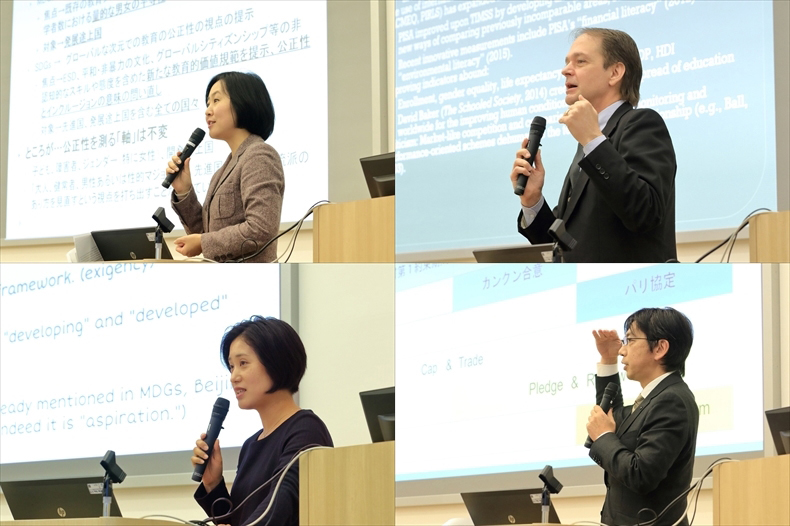
The session on "SDGs from Liberal Arts Perspectives" was a project collaborated by members of multiple ICU research institutes. Dr. Mikiko Nishimura, from the Institute for Educational Research and Service (IERS) critically examined implications of contending views on equity in the education-related targets. Dr. Mark Langager (IERS) discussed the four baskets of sustainable literacies: the measurables, the practicals, the concerns, and the disruptives. Dr. Kana Takamatsu (Gender Studies Center) focused on improvements and shortcomings in the targets on gender and sexuality, and called for transforming the aspirational goal into actions. Dr. Katsuhiko Mori (Social Science Research Institute) analyzed the key indicators for climate actions and clean energy, and contrasted between the three pillars of sustainable development and planetary boundaries.
【Symposium】Action Dialogue for Transforming the World
Multiple stakeholders from business and civil society participated in "Action Dialogues for Transforming the World." Mr. Akio Nomura (GCNJ), in a SDGs panel, reported on activities, such as sharing good practices and exchanging information and knowledge. Mr. Akihiko Tonsho and Ms. Rie Nobukawa from Marubeni Corporation explained that the textile plant rehabilitation project in Angola and their participation in the water project in Metro Manila can be seen as the contributions to several of the SDGs. Mr. d'Arcy Lunn (ICU graduate student, Teaspoons of Change), who has been campaigning for the global goals, stressed that even small actions, multiplied by lots of people can equal big change. Ms. Mikoto Kawaguchi (ICU senior student) explained her experience of participating the youth program of the UNGC China-Japan-Korea Roundtable in Beijing last summer, and introduced a video film created there.

